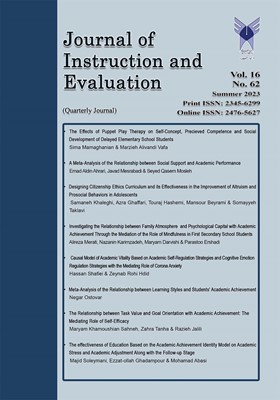-
-
List of Articles
-
Open Access Article
1 - The Effects of Puppet Play Therapy on Self-Concept, Precieved Competence and Social Development of Delayed Elementary School Students
Sima mamaghaniyan Marziyeh Alivandi Vafa -
Open Access Article
2 - A Meta-Analysis of the Relationship between Social Support and Academic Performance
Emad Aldin Ahrari Javad Mesrabadi Seysd Qasem Mosleh -
Open Access Article
3 - Designing Citizenship Ethics Curriculum and its Effectiveness in the Improvement of Altruism and Prosocial Behaviors in Adolescents
samanaeh khaleghi Azra Ghaffari touraj hashemi Mansour Beyrami Somayeh Taklavi -
Open Access Article
4 - Investigating the Relationship between Family Atmosphere and Psychological Capital with Academic Achievement Through the Mediation of the Role of Mindfulness in First Secondary School Students
Alireza Merati Nazanin Karimzadeh Maryam Darvishi Parastoo Ershadi -
Open Access Article
5 - Causal Model of Academic Vitality Based on Academic Self-Regulation Strategies and Cognitive Emotion Regulation Strategies with the Mediating Role of Corona Anxiety
Hassan Shafiei Zeynab Rohi Hdid -
Open Access Article
6 - Meta-Analysis of the Relationship between Learning Styles and Students' Academic Achievement
negar ostovar -
Open Access Article
7 - The Relationship between Task Value and Goal Orientation with Academic Achievement: The Mediating Role of Self-Efficacy
Maryam Khamushian Sahneh zahra tanha Razieh jalili -
Open Access Article
8 - The effectiveness of Education Based on the Academic Achievement Identity Model on Academic Stress and Academic Adjustment Along with the Follow-up Stage
majid soleymani Ezatolah Ghadampour mohamad abasi
-
The rights to this website are owned by the Raimag Press Management System.
Copyright © 2021-2025







